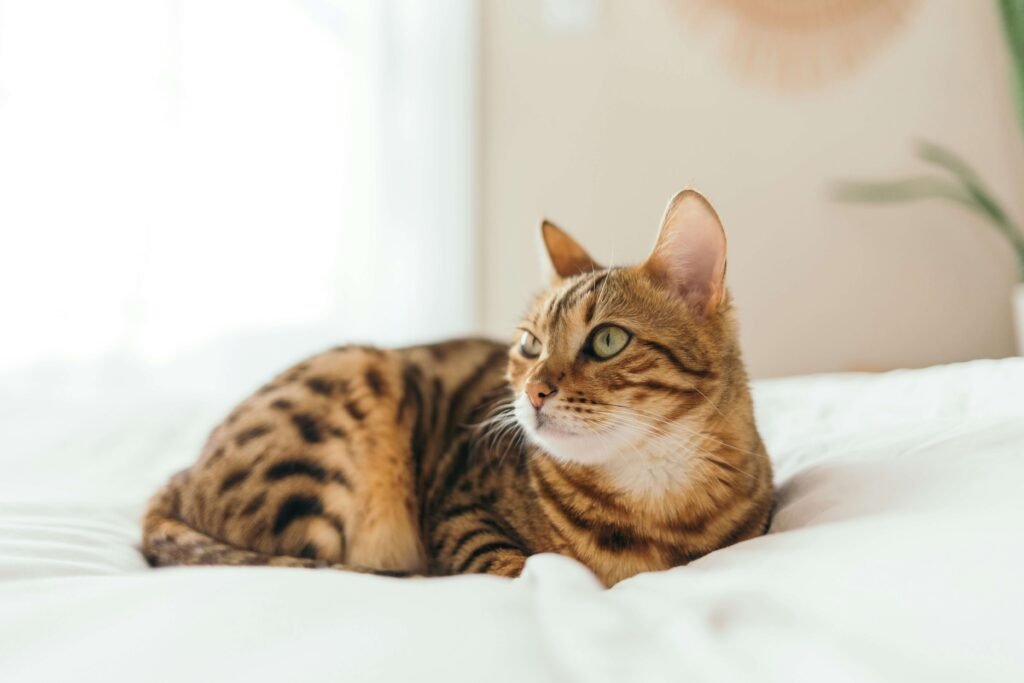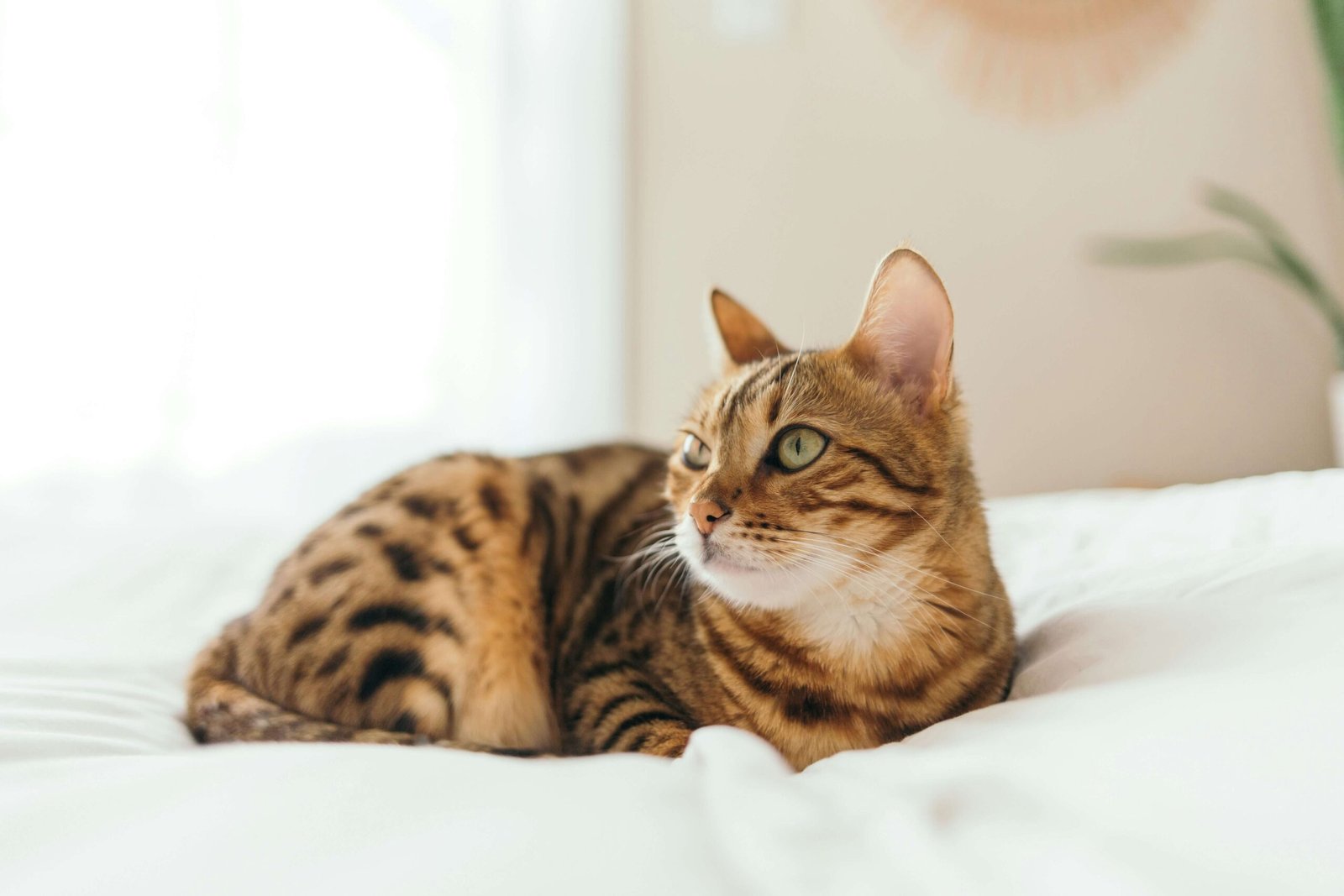How Long Do Bengal Cats Live? Understanding Their Lifespan
Bengal cats are known for their striking appearance, playful nature, and affectionate personalities. These feline companions have captured the hearts of cat lovers worldwide. But one question that often arises when considering bringing a Bengal into your home is: how long do Bengal cats live? Understanding their life expectancy can help you provide the best care possible and ensure a long, healthy, and happy life for your furry friend. In this blog post, we’ll explore everything you need to know about Bengal cats’ lifespan, factors that influence it, and tips for maximizing their years by your side.
Factors Influencing Bengal Cat Life Expectancy
A Bengal cat’s life expectancy depends on various factors, including genetics, lifestyle, and overall health management. Let’s take a closer look at some of the key elements that can affect how long your Bengal cat lives:
Genetics:
Bengals inherit traits from their ancestors, which can influence their susceptibility to certain health conditions. Responsible breeding practices play a crucial role in minimizing genetic risks.Diet and Nutrition:
A balanced and nutrient-rich diet is essential for maintaining your Bengal’s health and longevity. Poor nutrition can lead to obesity and other health issues.Exercise and Mental Stimulation:
Bengals are highly active and intelligent cats. Providing them with plenty of opportunities to play and explore helps keep them physically fit and mentally sharp.Veterinary Care:
Regular check-ups, vaccinations, and preventive treatments are vital for catching potential health problems early and ensuring your Bengal stays in top shape.Living Environment:
A safe, stress-free home environment contributes significantly to a Bengal’s well-being and overall lifespan.
Understanding these factors can empower you to make informed decisions about your Bengal’s care and create an environment where they can thrive.
Average Lifespan of Bengal Cats: What You Need to Know
On average, Bengal cats live between 12 to 16 years, but with proper care, some may even reach their late teens or early twenties. Here’s a breakdown of what influences this range:
Indoor vs. Outdoor Living:
Indoor Bengals tend to live longer due to reduced exposure to dangers like traffic, predators, and diseases.Health Conditions:
Some Bengals may be prone to specific illnesses such as hypertrophic cardiomyopathy (HCM) or chronic kidney disease, which can impact their lifespan if not managed properly.Breeding Practices:
Reputable breeders prioritize health testing and ethical breeding standards, which can positively affect a Bengal’s life expectancy.Lifestyle Choices:
Engaging your Bengal in daily activities and providing enrichment toys can enhance their quality of life and potentially extend their lifespan.Early Detection of Issues:
Spotting signs of illness early and seeking prompt veterinary attention can prevent minor issues from becoming major problems.
By focusing on these aspects, you can help ensure your Bengal enjoys a long and fulfilling life.
Check this guide 👉The Enchanting World of the White Bengal Cat: Best 7 Tips!
Check this guide 👉How Much Does a Bengal Cat Cost? Best 7 Buying Tips!
Check this guide 👉The Majestic Blue Bengal Cat: Best 7 Expert Care Tips!

Factor Affecting Lifespan | Tips to Maximize Longevity |
|---|---|
Diet and Nutrition | Feed high-quality food tailored to their needs. |
Exercise | Provide interactive toys and climbing structures. |
Veterinary Care | Schedule annual vet visits and stay updated on vaccines. |
Stress Management | Create a calm and enriching home environment. |
Preventive Measures | Use flea/tick prevention and dental care routines. |
Common Health Concerns in Bengal Cats
While Bengals are generally robust and energetic, they can still face certain health challenges. Being aware of these common issues allows you to address them proactively:
Hypertrophic Cardiomyopathy (HCM):
This heart condition is prevalent in Bengals and requires regular screenings to monitor its progression.Chronic Kidney Disease (CKD):
Older Bengals may develop CKD, emphasizing the importance of hydration and routine blood tests.Allergies and Skin Conditions:
Bengals can suffer from allergies, leading to itching or hair loss. Identifying triggers early is critical.Luxating Patella:
This joint issue affects mobility and should be monitored through exercise and weight management.Gastrointestinal Sensitivities:
Bengals sometimes experience digestive upsets; feeding easily digestible foods can alleviate symptoms.
By staying vigilant and addressing these concerns promptly, you can safeguard your Bengal’s health and improve their chances of living a longer life.
Ways to Enhance Your Bengal’s Quality of Life
Beyond simply extending their lifespan, improving your Bengal’s quality of life ensures they remain happy and vibrant throughout their years. Consider implementing these strategies:
Interactive Playtime:
Spend at least 20 minutes daily playing with your Bengal using wand toys or laser pointers.Climbing Structures:
Install cat trees or shelves to satisfy their natural instinct to climb and jump.Mental Challenges:
Puzzle feeders and treat-dispensing toys stimulate their minds and prevent boredom.Social Interaction:
Bengals thrive on companionship, so dedicate time to bonding or consider adopting another pet.Routine Grooming:
Regular brushing not only keeps their coat shiny but also strengthens your bond with them.
These small yet impactful steps can make a world of difference in your Bengal’s happiness and well-being.
Essential Vaccinations for Bengal Cats
Vaccinations are a cornerstone of preventive healthcare for Bengal cats. They protect against infectious diseases that could otherwise shorten their lifespan or severely impact their quality of life. Here’s what you need to know about keeping your Bengal up-to-date on essential vaccines:
Core Vaccines:
These include protection against feline panleukopenia, calicivirus, and rhinotracheitis—common and potentially fatal illnesses in cats.Rabies Vaccine:
Required by law in many areas, this vaccine not only protects your Bengal but also prevents the spread of rabies to humans and other animals.Non-Core Vaccines:
Depending on your cat’s lifestyle, vaccines for feline leukemia virus (FeLV) or bordetella may be recommended by your veterinarian.Booster Shots:
Regular booster vaccinations ensure continued immunity as your Bengal ages.Side Effects Monitoring:
While rare, some Bengals may experience mild side effects like lethargy or swelling at the injection site; report any concerns to your vet immediately.
Staying on top of your Bengal’s vaccination schedule is a simple yet effective way to safeguard their health and maximize their lifespan.
Tips for Managing Bengal Cat Stress
Bengal cats are sensitive creatures, and stress can negatively impact both their physical and mental well-being. Reducing stressors in their environment is key to ensuring they live a long and happy life. Here are some practical tips for managing stress in your Bengal:
Create Safe Spaces:
Provide cozy hiding spots or enclosed beds where your Bengal can retreat when feeling overwhelmed.Maintain Consistent Routines:
Cats thrive on predictability, so stick to regular feeding, playtime, and bedtime schedules whenever possible.Minimize Loud Noises:
Sudden or constant loud sounds can startle Bengals; use white noise machines or close windows during noisy events.Introduce New Changes Gradually:
Whether it’s a new pet, furniture, or routine, gradual introductions help Bengals adjust without becoming anxious.Use Calming Products:
Pheromone diffusers or calming sprays can create a soothing atmosphere in your home.
By addressing potential sources of stress, you can foster a peaceful environment where your Bengal feels secure and content.
Nutritional Supplements for Bengal Cats
While a balanced diet is crucial, certain nutritional supplements can further support your Bengal’s overall health and longevity. Always consult your veterinarian before introducing any new supplement. Here are some options worth considering:
Omega-3 Fatty Acids:
These promote healthy skin, a shiny coat, and reduced inflammation, often found in fish oil supplements.Probiotics:
Probiotics improve gut health and digestion, helping prevent gastrointestinal issues common in Bengals.Glucosamine and Chondroitin:
These joint-supporting supplements can benefit older Bengals or those prone to mobility issues.Taurine:
An essential amino acid, taurine supports heart and eye health, though most high-quality cat foods already contain adequate amounts.Multivitamins:
A general multivitamin can fill any nutritional gaps, especially if your Bengal has specific dietary restrictions.
Supplements can complement your Bengal’s diet and address unique health needs, contributing to a longer, healthier life.
Frequently Asked Questions About Bengal Cat Life Expectancy
How long do Bengal cats typically live?
On average, Bengal cats live between 12 to 16 years, though some may live longer with excellent care.
Are Bengal cats prone to any serious health issues?
Yes, they may be susceptible to conditions like hypertrophic cardiomyopathy and chronic kidney disease.
Can I keep my Bengal outdoors?
It’s safer to keep Bengals indoors to protect them from accidents, predators, and diseases.
What kind of diet is best for a Bengal cat?
A high-protein, low-carbohydrate diet mimicking their natural prey-based nutrition is ideal.
How often should I take my Bengal to the vet?
Annual wellness exams are recommended, with more frequent visits if any health concerns arise.
Conclusion: Cherishing Every Moment with Your Bengal Cat
Bringing a Bengal cat into your life is a rewarding experience filled with love, laughter, and endless energy. By understanding their life expectancy and taking proactive steps to enhance their well-being, you can enjoy many wonderful years together. Remember, every moment counts—whether it’s watching them chase a feather toy or curling up beside you on the couch. With dedication, care, and plenty of affection, your Bengal can live a long, joyful life, leaving pawprints on your heart forever.
Dog Tapeworm Life Cycle: Best 7 Expert Tips! – Learn how tapeworms infect dogs, spot symptoms, and break the cycle with expert prevention strategies.
Anxious Cat Body Language: Best 7 Expert Tips! – Learn to spot signs of stress, understand triggers, and help your cat feel safe and relaxed.
Anxious Dog Body Language: Best 7 Expert Tips! – Learn to spot signs of anxiety, respond effectively, and help your dog feel safe and secure.
Is Breeding Dogs Bad? Best 7 Expert Tips! – Explore the ethics, benefits, and risks of dog breeding to make informed decisions for a better future.





